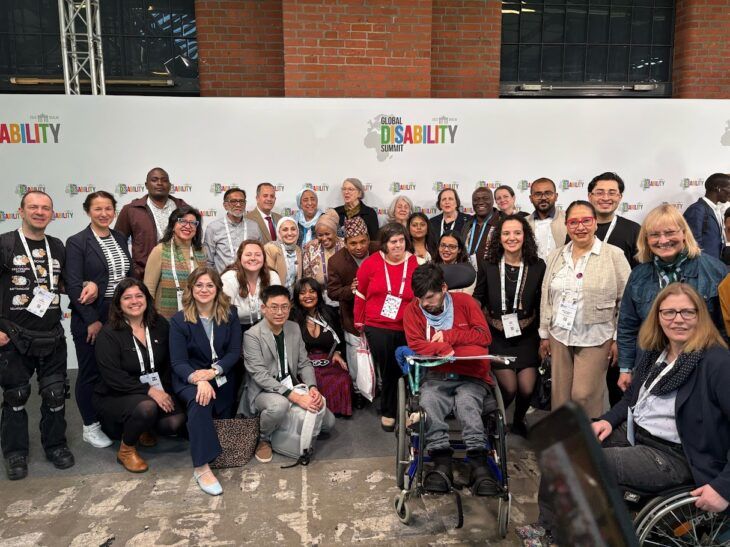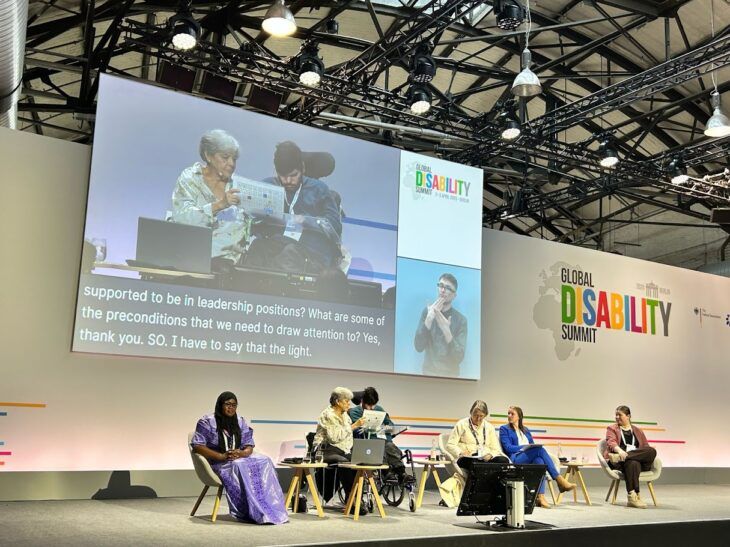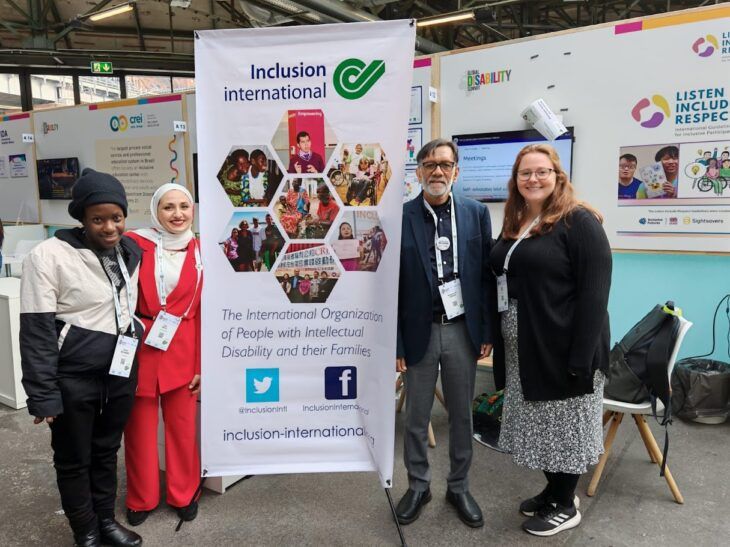Blog
Our Network at the Global Disability Summit: Self-Advocates Leading Change
- Inclusive participation & citizenship
- Inclusive education
- Support for Families
- Inclusive development & aid
- Closing institutions
At the 2025 Global Disability Summit in Berlin, our network showed what inclusion looks like in action.
More than 75 people represented Inclusion International, including self-advocates, family members, and staff from 31 national member organisations and 3 regional networks: Inclusion Africa, Inclusion Europe, and Inclusion MENA.
Together, we represented 32 countries.
Our Messages on Stage and in the Room
Self-advocates led conversations from the main stage to side events.
Mia Farah (LASA), Shiva Shrestha (PFPID), Soufiane El Amrani (Inclusion Europe), and Claudia Franke (Lebenshilfe) co-led a side event on self-advocacy, co-hosted with our member from Germany, Lebenshilfe.

Other self-advocates joined them on stage to speak directly to an audience of more than 200 people. They shared how self-advocacy is key to making rights real.
We also co-hosted a side event on ending institutionalisation with the UK’s Foreign, Commonwealth and Development Office (FCDO). The event featured Maria Cáceres, a self-advocate from our member in Spain, Plena Inclusión, who spoke about their Mi Casa project.
We also heard from a young person from Moldova who also shared their experience of growing up in an institution.
Ministers from Jordan and the UK spoke about their current work and commitments on deinstitutionalisation. A panel of civil society speakers, including Milan Šveřepa from Inclusion Europe, closed the event by sharing tools and examples of what works.
Jeleel Odoom (Inclusion Africa) and Fatma Wangare Haji (Inclusion Africa) spoke in plenaries about international development, the regional Summits and inclusive employment.
Monica Cortes (Asdown Colombia), Juan Cobeñas (Asociación Azul), and our President Sue Swenson joined as speakers and moderators at the Civil Society Forum.

At the Inclusive Education Hub, Fadia Farah (Lebanese Association for Self-Advocacy), Monica, and Sue shared our network’s work and priorities on education in emergencies.
We also took part in a fireside chat on ending institutionalisation, alongside other members of the Global Coalition on Deinstitutionalisation.
At our joint exhibition booth with Down Syndrome International, we shared the Listen Include Respect guidelines. We also announced new Arabic translations of the guidelines, supporting advocacy and inclusion in the MENA region.

Influencing the Global Agenda
We used the Summit to talk with key decision-makers and build future partnerships.
We met with the FCDO to discuss inclusive education and their new global campaign to stop children from being placed in institutions.
We also met with the UN Special Rapporteur on the Rights of Persons with Disabilities, with whom we discussed the rights of families and potential joint actions on families.
The Voices of Self-Advocates Were Everywhere
Self-advocates met with their national delegations, joined regional meetings, and represented our network in side events and discussions. They used these spaces to share our advocacy messages clearly and directly.
To make sure our voices were included in the official conversation, we released new resources ahead of the Summit:
- The Global Disability Inclusion Report – Executive Summary in Easy to Understand format. Self-advocates created this using the Listen Include Respect guidelines to make the official Global Disability Inclusion Report accessible to all.
- Big Issues in Our Lives: Self-Advocate Voices on Global Disability Issues. These guides explain what self-advocates think about 11 important topics – including employment, education, health care, and social protection – and what needs to change.
Self-advocates helped create these tools – they weren’t just made for them.
They give our network a shared message and language we can all use to keep advocating after the Summit ends.
Looking Ahead
The Global Disability Summit is a space for governments, donors, and civil society to make commitments to advance the rights of people with disabilities.
This year, our network showed what real participation looks like – not just being in the room, but leading the conversation.
Self-advocates helped shape the agenda, spoke directly to power, and brought the voices of people with intellectual disabilities and their families into global discussions.
Advocacy continues now by monitoring the implementation of the commitments. They will be public on the 5th May. Everyone can check the commitments made by their governments and use them in their advocacy.
We will keep building on this work, making sure that global efforts reflect what matters to us: being included, respected, and listened to.